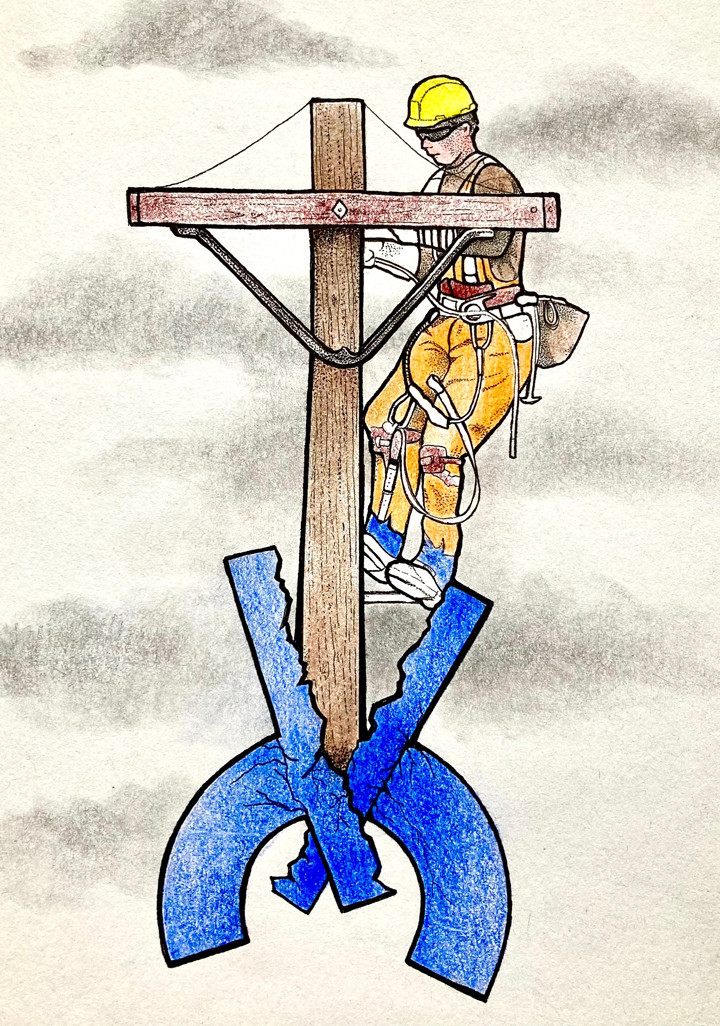Hydro tensions
Strikes and opposition to Bill 35 creating friction at Manitoba Hydro

Illustration by Gabrielle Funk
Over the past few weeks, a host of tensions have arisen involving Manitoba Hydro.
Following 28 months of negotiations, the International Brotherhood of Electrical Workers Local 2034 (IBEW 2034) announced that Manitoba Hydro workers would strike on a rotating basis. After Manitoba Hydro failed to meet the 5 p.m. deadline on March 17, the IBEW declared a general strike involving Hydro’s 2,300 electrical workers.
IBEW 2034 stated the reasoning behind the strike was Manitoba Hydro’s lack of responsiveness to the proposed negotiations, which included the agreement that no worker would be laid off as a result of contracting out work and a 0.75 per cent wage increase in the third year.
At the time of writing, the IBEW 2034 workers were striking on a rotating basis after another contract was rejected by 88 per cent of the workers.
Jesse Hajer, an assistant professor of economics and labour studies at the University of Manitoba, says the Province has “taken a fairly aggressive approach to labour negotiations with public-sector workers.”
He adds that the provincial government recently lost a court ruling regarding legislation “interpreted by the courts as unfairly limiting the rights of workers to collectively bargain.”
At the time of the strike, the Manitoba New Democratic Party (Manitoba NDP) vowed to block Bill 35, the Public Utilities Ratepayer Protection and Regulatory Reform Act.
Wab Kinew, the leader of the Manitoba NDP, says the impetus to do so rested on fears that the bill would compromise affordable electricity, concerns around climate change and the ability to support remote Indigenous communities. He says the block will allow the public to “have an extra six months to get engaged, to organize and to make sure their voices are heard.”
Though Premier Brian Pallister previously vowed to not privatize Manitoba Hydro in October 2020, Kinew says the legislation undermines the public’s voice in Manitoba Hydro’s future.
“If we lose those public hearings after Bill 35 is passed, there’s no protection in place (preventing) this government (from going) ahead and break(ing) off Manitoba Hydro and privatiz(ing) it,” Kinew says. “The Public Utilities Board is really important, because that’s the organization that stands up to the public when it comes to Manitoba. This bill effectively removes their role.”
Hajer says Manitoba Hydro’s status as a publicly owned Crown corporation has many advantages, including low rates, public profit and the ability to achieve economic-development objectives.
“The broader public ownership of Manitoba Hydro has allowed us to keep rates among the lowest in North America,” Hajer says. “Instead of having high hydro rates and paying out profits to private shareholders, we keep rates low, and everyone in Manitoba benefits.”
In the event that Manitoba Hydro is privatized, Hajer says he has “no doubt” that hydro rates would increase for Manitobans. He also adds that it would be more difficult to ensure a private corporation would be attentive to goals such as greenhouse gas-emission targets and a transition to more sustainable energy sources.
Published in Volume 75, Number 23 of The Uniter (March 25, 2021)







